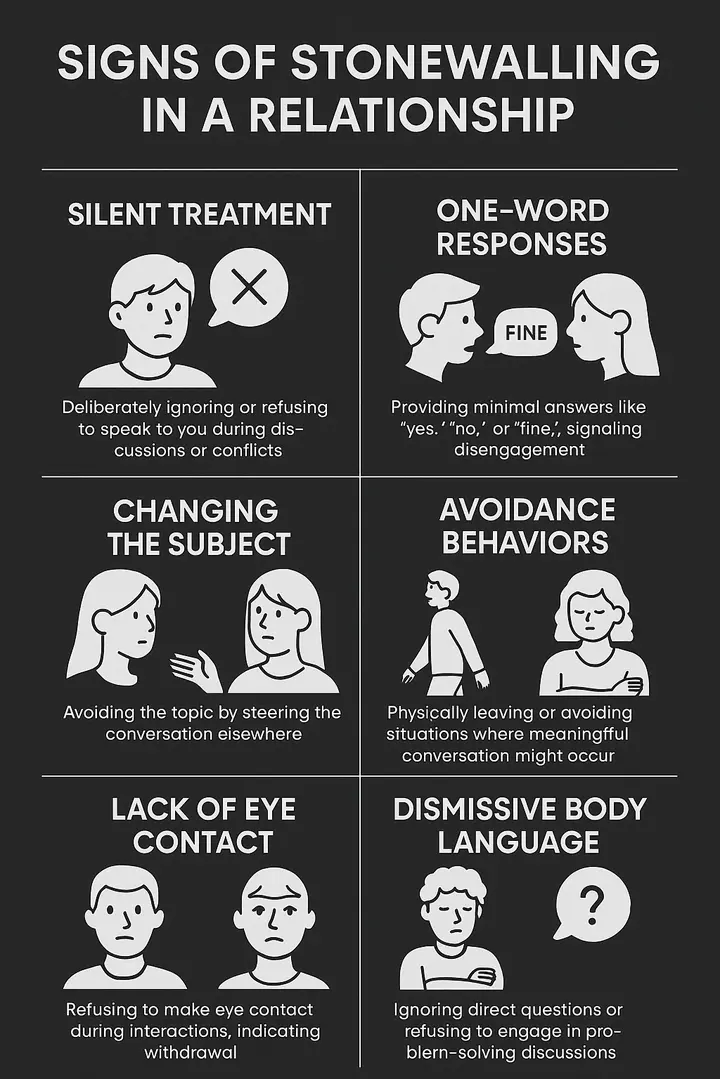Is Stonewalling Emotional Abuse? What to Do When a Partner Shuts Down

Experiencing a loved one suddenly withdraw, shut down, and refuse to communicate during a disagreement can be profoundly unsettling.
This behavior, known as stonewalling, creates an emotional chasm, leaving the person on the receiving end feeling isolated, dismissed, and unheard.
From our experience in supporting individuals through challenging relational dynamics, we understand the deep distress and confusion stonewalling can inflict.
It’s a common, yet deeply damaging, pattern that erodes trust and prevents genuine connection, often leading those affected to seek emotional abuse support.
This article provides a comprehensive look at stonewalling, offering insights and actionable strategies to navigate this silent storm.
Key Takeaways
What Is Stonewalling in a Relationship?
Stonewalling occurs when one partner disengages from a conversation or argument, refusing to respond or engage. It’s more than just a temporary pause to gather thoughts; it’s a deliberate or habitual shutdown of communication.
Imagine trying to discuss a significant concern, only to be met with a blank stare, averted eyes, or complete silence.
Your words might feel like they’re bouncing off an invisible wall. This withdrawal can manifest as ignoring what the other person is saying, changing the subject, physically leaving the room, or giving one-word, dismissive responses like “fine” or “whatever.”
In our work, we’ve observed that this behavior effectively brings any attempt at problem-solving or emotional connection to a halt.
Dr. John Gottman, a leading relationship psychologist, identifies stonewalling as one of the “Four Horsemen of the Apocalypse” – destructive communication patterns that can predict relationship breakdown and divorce.
Do You Feel You Are Dating A Narcissist Currently?
How Does Stonewalling Manifest?
Recognizing stonewalling can sometimes be challenging, as it can be subtle. Over time, these signs become more apparent and frequent, deeply affecting the relationship.
Visible signs of stonewalling in a relationship:
From our experience, partners often report feeling like they are “talking to a brick wall” or that their concerns are being minimized. This constant dismissal fosters significant distress.
Why Do People Stonewall?
While stonewalling is damaging, it’s not always driven by malice. Often, it’s a defense mechanism, a behavior born out of fear, anxiety, and an inability to manage intense emotions.
Common Reasons for Stonewalling:
It’s important to differentiate between unintentional stonewalling, a coping strategy, and intentional stonewalling, which is used to manipulate or control.

What Are the Effects of Stonewalling on a Relationship?
The impact of stonewalling extends far beyond the immediate argument. It systematically erodes the foundation of trust, intimacy, and respect that healthy relationships require.
Consequences for the Person Being Stonewalled:
Consequences for the Person Who Stonewalls:
While stonewalling might offer temporary relief from perceived conflict, it comes at a cost. The individual often feels emotionally drained and disconnected, experiencing their own form of isolation.
They miss opportunities to build resilience, develop emotional regulation skills, and deepen their relationships.
Stonewalling is one of the ‘Four Horsemen of the Apocalypse,’ or indicators that if nothing changes in the relationship, it will fail. It’s a technique some people use when they feel they’ve lost control in a conflict, and it involves putting up an emotional wall between yourself and the other person in the relationship.
John Gottman, The Gottman Institute
Ultimately, stonewalling prevents problem-solving, creates unresolved issues, and can lead to long-term dissatisfaction, bitterness, or the dissolution of the relationship. Research by Dr. Gottman and others suggests stonewalling is a strong predictor of divorce.

Can Stonewalling Be a Form of Emotional Abuse?
This is a critical question for many seeking emotional abuse support. The distinction between a temporary coping mechanism and abuse often lies in intent and pattern.
While unintentional stonewalling stems from a person’s inability to cope, when stonewalling is used deliberately and consistently to manipulate, punish, control, or demean a partner, it absolutely constitutes emotional abuse.
Emotional abuse aims to exert power and control, undermining a partner’s self-esteem and sense of reality. Intentional stonewalling can be a tactic of coercive control, often paired with other abusive behaviors like gaslighting.
This form of silent treatment leaves the victim feeling helpless, worthless, and powerless, making it difficult for them to leave the relationship.
Key Indicators of Abusive Stonewalling:
If you suspect stonewalling in your relationship is a form of emotional abuse, it’s crucial to acknowledge this and seek support. (learn more about recognizing the signs of emotional abuse.)

How Can You Respond When Your Partner Stonewalls?
Responding to stonewalling requires a delicate balance of self-care and strategic communication. It’s challenging when your instinct might be to push for engagement, which can sometimes backfire.
Strategies for the Person Being Stonewalled:
1. Recognize and Name the Behavior: Acknowledge what is happening without judgment. Understanding that it’s stonewalling can help you depersonalize the immediate reaction.
2. Stop Pulling: If your partner has disengaged, trying to force communication will likely intensify their withdrawal. Take a step back.
3. Prioritize Physiological Self-Soothing: Focus on calming your own nervous system. Stonewalling can be infuriating, and it’s essential to manage your emotional response. Try deep breathing, taking a walk, listening to music, or journaling. This prevents you from escalating the conflict.
4. Communicate Your Needs Calmly, If Possible: When you are calm, express your feelings using “I” statements, focusing on how their withdrawal impacts you, rather than accusations. For example: “I feel hurt and disconnected when you go silent during our disagreements. I need to know we can talk things through.”
5. Set a Boundary and Request a Time-Out: Suggest a mutually agreed-upon break with a clear intention to return to the conversation. For example, “I can see this conversation is difficult right now.
I need us to take a break for 20 minutes to calm down, and then we can revisit this. Is that something you can agree to?” Ensure the break is long enough (at least 20 minutes) for physiological calming.
6. Create a Safe Space: Help your partner feel emotionally safe. This means holding back your own frustration and approaching them with empathy, showing them that it’s safe to express themselves without fear of lashing out.
7. Seek External Support: Talk to a trusted friend, family member, or therapist. Processing your feelings and getting an objective perspective is crucial for your well-being.
8. Assess the Relationship: If stonewalling is a persistent and abusive pattern, it may be time to consider the health and future of the relationship, possibly with professional guidance.
Discover Your Inner Self. Join Our Self-Mastery Program.
Self-Mastery Coaching gives you the space, tools, and guidance to grow, reflect and discover your values and inner strength.

How Can You Stop Stonewalling Yourself?
If you recognize stonewalling in your own behavior, acknowledging it is the powerful first step towards change. This demonstrates self-awareness and a commitment to healthier interactions.
Steps to Overcome Stonewalling:
1. Identify Your Triggers: Understand what situations or emotions lead you to shut down. Is it feeling attacked, overwhelmed, misunderstood, or fearing your partner’s reaction?
2. Learn to Self-Soothe Physiologically: This is paramount. Before you completely shut down, recognize the signs of emotional flooding (increased heart rate, tension) and actively engage in calming techniques. This could be deep breathing exercises, a short walk, listening to music, or mindfulness.
3. Communicate Your Need for a Break: Instead of simply withdrawing, verbalize your need for a pause. Use a clear, pre-agreed signal or phrase. For example: “I’m feeling overwhelmed right now and need a short break to collect my thoughts.
Can we resume this discussion in 20 minutes?” This respectful approach maintains connection and trust.
4. Return to the Conversation: Crucially, honor your commitment to return to the discussion after the agreed-upon break. This rebuilds trust and shows your partner that their concerns matter.
5. Develop Emotional Literacy and Communication Skills: Practice identifying and expressing your emotions directly, using “I” statements. Learning to articulate what you’re feeling, even if it’s “I feel confused” or “I need more time to process,” is vital. [learn how to improve your communication skills](/effective-communication-strategies/).
6. Challenge Underlying Beliefs: Explore any beliefs that perpetuate stonewalling, such as “emotions are dangerous” or “conflict is always destructive.”
7. Seek Individual Therapy: A therapist can help you explore the roots of your stonewalling, develop healthier coping mechanisms, and improve your emotional regulation skills.

When Should You Seek Professional Help?
Recognizing when to seek external support is a sign of strength and a commitment to your relationship’s health.
Consider Professional Help If:
Both individual and couples therapy can provide invaluable tools and guidance. A therapist can help identify the underlying causes of stonewalling, teach effective communication strategies, facilitate healthy conflict resolution, and help both partners process the emotional impact.
They can create a safe space for dialogue, helping couples rebuild trust and emotional connection. [learn more about couples counseling options].
Subscribe to Create Higher Vibrations!
Get Inspiration and Practical advice straight to your inbox.
Building a Foundation of Openness and Trust
Stonewalling poses a serious threat to any relationship, slowly dismantling the connection and fostering deep emotional wounds. However, it’s not an insurmountable barrier. With genuine effort, self-awareness, and a commitment to change, couples can learn to dismantle these silent walls.
By understanding the roots of stonewalling, recognizing its manifestations, and implementing deliberate strategies for engagement and self-soothing, partners can cultivate a relationship built on empathy, respect, and open communication.
It requires patience and a willingness to engage, even when it feels uncomfortable. Ultimately, transforming a pattern of stonewalling into constructive dialogue is an act of profound care, paving the way for a more resilient, intimate, and fulfilling partnership.


